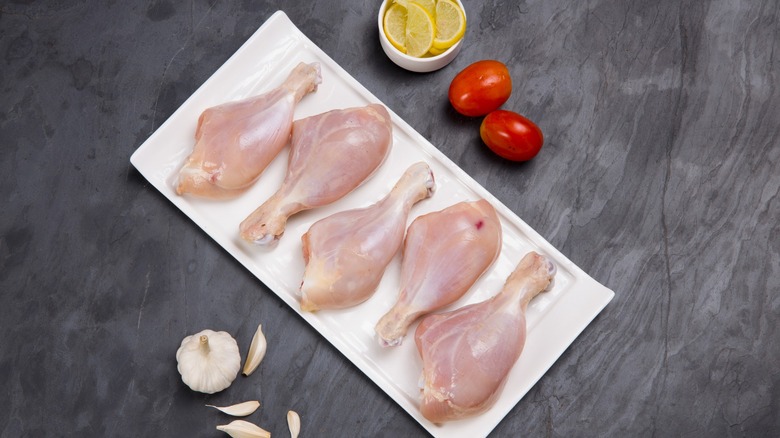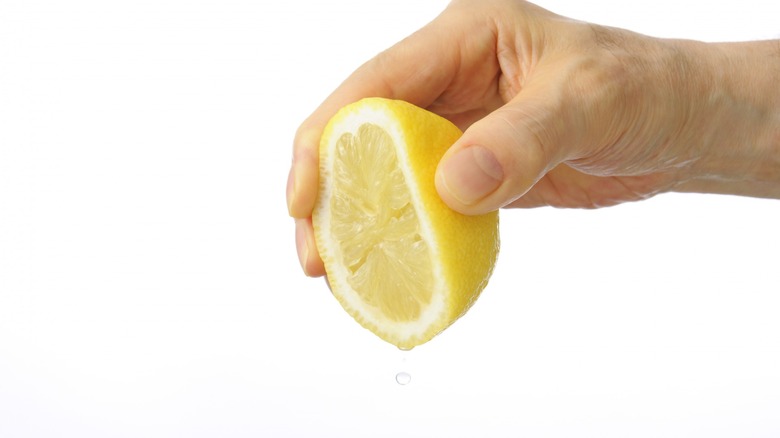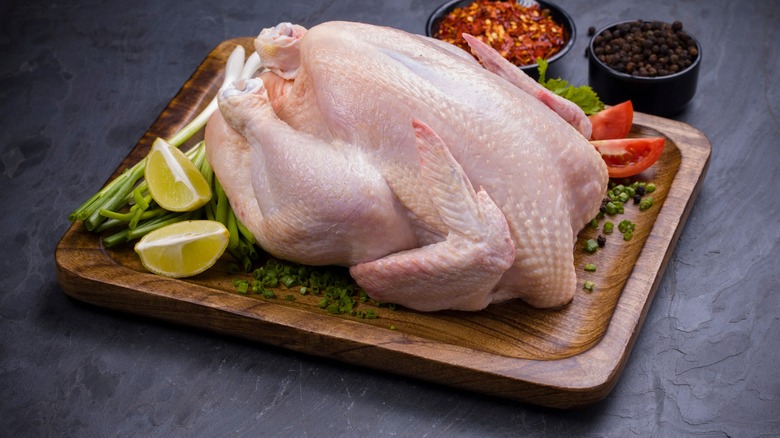Rinse Raw Chicken In Lemon Juice To Avoid Bacteria Splatter
Safely handling raw chicken is essential for avoiding bacterial contamination, and it's important to remember that these germs don't just spread through consumption. It's also possible to splatter harmful bacteria in your sink and on your countertop if you're not careful when washing your cut of poultry. That's why it's easier and safer to rinse your chicken in a lemon shower or soak it in a lemon bath before preparing it for cooking.
Plenty of lemon-based chicken recipes exist, but if you're not looking to add a slight tartness to your bird, there's no need to worry. Washing chicken with lemon juice is a standard part of meal prep in the West Indies and the Caribbean, as well as Indonesia and Ethiopia, and was helpful in cleaning chicken before refrigerators. The acid in the lemon is not only helpful in rinsing off the meat, but it will also get rid of that stale odor that chicken can pick up during storage.
How lemon juice helps clean chicken
The low pH value of the citric acid within lemon juice has antibacterial properties due to its ability to counteract the higher pH environments bacteria are usually attracted to. The lemon also denatures proteins on the surface of the chicken, similar to how citrus "cooks" fish in ceviche. This will impart a tenderizing effect, making the chicken softer and juicier as a bonus. Vinegar also works as a cleaning agent due to its similar acidity.
Be aware that neither washing chicken in the sink nor soaking it in lemon will actually kill anything. Rather, the lemon acts as a surfactant, making it easier for germs to rinse off instead of killing them. In other words, you're just helping to wash anything off that might be responsible for the chicken's odor, as well as any other more dangerous contaminants. Sometimes, chicken may even have a chlorine-like smell, which means that it has, in fact, already been washed in a bleach solution. The benefit of giving the chicken a bath is that you're gently rinsing it instead of splashing whatever pathogens are on the surface to the rest of your kitchen.
Not totally lemon fresh
It's important to note that acids like lemon juice and vinegar aren't a foolproof method of cleaning your chicken. According to nutrition science and food safety expert Jennifer Quinlan of Drexel University's nursing and health department, "There's no reason to think that adding a bit of acid to your water will kill the pathogens present either in the rinse or on the chicken," via NPR. In addition, a 2018 report from the journal Food Control that analyzes food safety found that a 10% "diluted lemon or vinegar solution was an inefficient method for removing pathogens."
Soaking your chicken in lemon juice may be an effective way to neutralize odors and rinse off some bacteria, but it won't act as a complete disinfectant. Rather, it's a safer alternative to washing your chicken off in the sink, and the lower pH environment will help prevent new bacteria from growing. You shouldn't totally trust lemon to kill off all the little nasties on the surface of raw chicken, but it's certainly safer and more beneficial than running it under a faucet.



